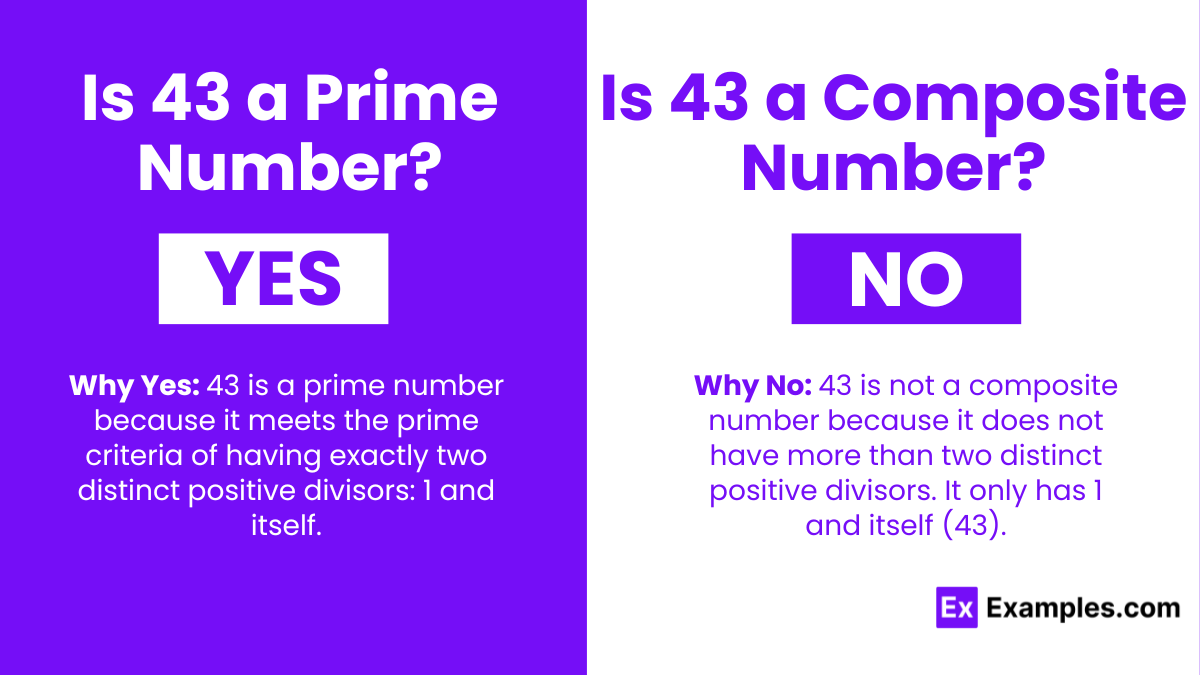Is 43 a prime number or a composite number?
Prime
Composite
Neither
Both


Yes – 43 is a Prime Number.
Why Yes: 43 is a prime number because it meets the prime criteria of having exactly two distinct positive divisors: 1 and itself. Check Prime or Not
No – 43 is not a Composite Number.
Why No: 43 is not a composite number because it does not have more than two distinct positive divisors. It only has 1 and itself (43).
| Property | Answer |
|---|---|
| Is 43 a prime number? | Yes |
| Is 43 a composite number? | No |
| Is 43 a perfect square? | No |
| Factors of 43 | 1, 43 |
| Multiples of 43 | 43, 86, 129, 172, 215, 258, 301, 344, 387, 430 |
| Cube Root of 43 | 3.503 |
| Square of 43 | 1849 |
| Square Root of 43 | 6.557 |
| Is 43 a Perfect Square? | No |
| Is 43 a Perfect Cube? | No |
| Is 43 an Irrational number | No |
| Is 43 a Rational number | Yes |
| Is 43 a Real number | Yes |
| Is 43 an Integer | Yes |
| Is 43 a Natural number | Yes |
| Is 43 a Whole number | Yes |
| Is 43 an Even or odd number | Yes (43 is an odd number) |
| Is 43 an Ordinal number | Yes |
| Is 43 a Complex number | Yes (as all real numbers are also complex numbers) |
The factors of 43 are 1 and 43. 43 is a prime number because it is only divisible by 1 and itself, highlighting its unique nature. It has exactly two factors, making it clear that it is a prime number and not a composite number.
43 is recognized for its status as a prime number, marked by its divisibility only by 1 and itself. The number 43, as a prime number, holds a distinct place in mathematics and conceptual frameworks. Its properties as an odd number, a prime, and a natural number make it a significant figure in various mathematical discussions.
43 cannot be divided evenly by any number other than 1 and 43 itself, highlighting its status as a prime number.
43 is a prime number because it has only two distinct positive divisors: 1 and itself (43), fitting the definition of a prime number perfectly.
43 belongs to the class of odd prime numbers, as it is greater than two and not divisible by any even number, making it an odd prime.
Text prompt
Add Tone
10 Examples of Public speaking
20 Examples of Gas lighting
Is 43 a prime number or a composite number?
Prime
Composite
Neither
Both
Which of the following statements is true about the number 43?
It has more than two divisors.
It is a composite number.
It is only divisible by 1 and itself.
It is an even number.
What can you conclude about the number 43 based on its divisibility?
43 is divisible by 5.
43 is divisible by 7.
43 is not divisible by any number other than 1 and itself.
43 is divisible by 9.
If you were to factorize 43, what would the factors be?
1 and 43
1, 2, and 43
1, 3, and 43
1, 43, and 5
Which property does 43 have?
It is a composite number with exactly three factors.
It is a prime number with exactly two factors.
It is a composite number with exactly four factors.
It is neither prime nor composite.
Which of the following numbers is similar to 43 in terms of being prime?
44
45
46
47
Which of the following best describes the number 43?
43 is a multiple of 10.
43 is a multiple of 1 and itself.
43 is a factor of 50.
43 is a perfect square.
What is true about 43 in relation to the number 1?
43 is a factor of 1.
1 is a factor of 43.
43 is a multiple of 1.
43 is less than 1.
How does 43 compare to 44 in terms of prime status?
Both 43 and 44 are prime numbers.
43 is a prime number, but 44 is not.
Both 43 and 44 are composite numbers.
44 is a prime number, but 43 is not.
Which characteristic is not true about 43?
43 is a prime number.
43 is divisible by 6.
43 has exactly two factors.
43 is greater than 40.
Before you leave, take our quick quiz to enhance your learning!

